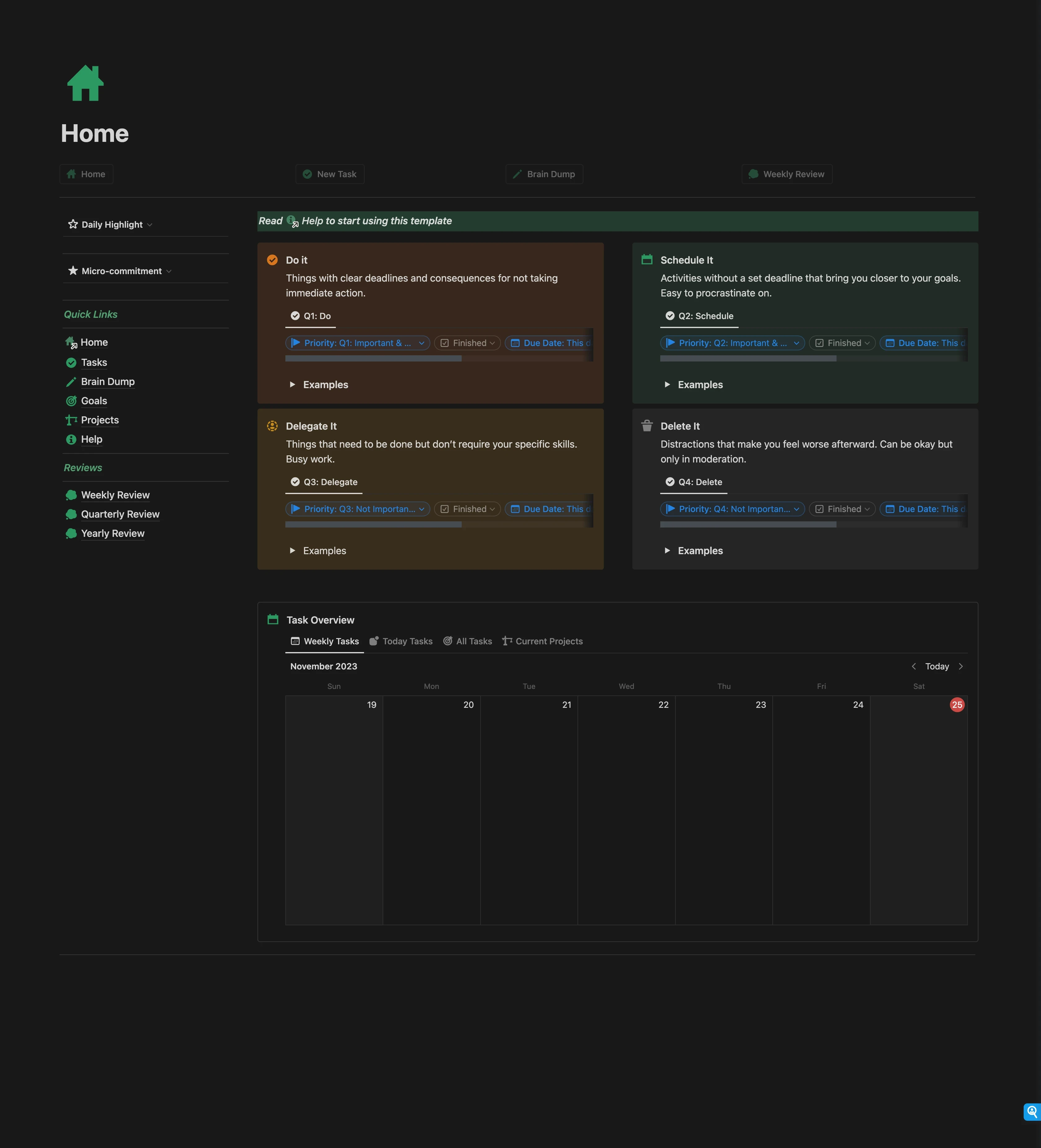Kaizen System


Made by Ruri Ohama
+1 Million Subscribers
Transform Chaos to Clarity
Not just a planner; a tool to help you live a life full of meaning
Get the template →
4.9 | 489 happy buyers
Which ultimately just leads to a cycle of busyness without ever actually focusing on the things that matter.
It's more than a planner; it's a tool for living a more organised, fulfilling life.
Do it
Things with clear deadlines and consequences for not taking immediate action
Schedule it
Activities without a set deadline that bring you closer to your goals. Easy to procrastinate on
Delegate it
Things that need to be done but don't require your specific skills. Busy work.
Delete it
Things with clear deadlines and consequences for not taking immediate action
The Eisenhower Matrix helps us to break that “someday” cycle - because we don’t just look at urgency, we look at importance - whether you want to do that thing.
external motivation
Immediate wants or external influences, like buying a trendy item because it is popular
Internal motivation
Core beliefs and what truly matters to you, like maintaining health for long-term wellbeing. Example : i want to be healthy
external motivation
External pressures or expectations, like choosing a career because it's what others expect of you. Example : I feel ashamed of my current situation
Internal motivation
Responsibilities and commitments, like fulfilling obligations as a family member or contributing to the society. Example : it's my duty as a leader to be healthy
This approach is designed to bring you not only success but a sense of genuine fulfilment and sustained motivation by breaking free from the cycle of burnout and overwhelm.
Micro Commitments
The micro-commitment section in the Kaizen System is a crucial feature that addresses one of the common challenges in goal setting and task completion: the overwhelming nature of large tasks or long-term goals.
By breaking down these larger objectives into smaller, more manageable commitments, it’ll help you maintain focus and momentum.
People with ADHD often struggle with consistency and setting their expectations too high and microcommitments are a way of building up a contrasting habit to help you overcome this.
Customizable & Adaptable
Everyone’s life is different, so their productivity system should be too.
The Kaizen System is fully customizable to fit your unique lifestyle and circumstances.
Whether you're a student, a professional, or juggling multiple roles, it adapts to you, ensuring it stays relevant and effective no matter what stage of life you’re in.
Practical, Action-Oriented Design
I’ve made sure the interface is straightforward and user-friendly. It’s designed for action, not distraction – making it easy for you to plan your day, your week, and your life, turning your visions into achievable actions.
This is aimed at helping you make real, consistent progress towards your goals.
Ultimately, no matter how much you read, or watch, or force yourself to learn, the best way to learn is by doing. Everything in this template is designed to help you take action so that you’re continuously making progress!
Weekly Reflection Area
Reflection is key to growth. Whether you have ADHD or not, you’re always going to procrastinate at different times in your life.
But if you can identify the patterns behind it and learn to prevent those things happening, then over time you build up the ability to overcome procrastination based on how your brain works.
It’s not just about what you did, but understanding how you did it, what you can improve, and how you can adjust your approach for the coming week.
The template will automatically give you feedback too - it’ll show how many tasks from each quadrant of the Eisenhower Matrix you’ve done, and it’ll tell you what to do next - so reflection is built into the system itself in a number of different, action-based ways.
Adopting the Kaizen System into your life is straightforward. Here’s how you can start transforming your productivity today:
Initial Setup and Goal Identification:
First, we'll dive into understanding the types of motivation — intrinsic and extrinsic. It’s crucial to identify what truly matters to you, and why some tasks feel like a chore while others are effortlessly enjoyable.
You'll learn to break down your goals into actions that you can control, and we’ll break them down into micro-commitments you can do every day.
After you set a goal, you’ll create micro-commitments which we’ll check in on daily, weekly and monthly to make sure you’re on track.
Daily Task Entry and Categorization:
Each day, you'll enter your tasks into the template. This is where the Eisenhower Matrix comes in, helping you categorise each task based on urgency and importance.
This simple yet powerful approach will be your guide in focusing on what’s essential for your long-term success.
We’ll also use things like the Daily Highlight to help you pick the most important thing you need to do each day and make sure you actually get it done.
Prioritization and Planning:
Based on your task categorization, you'll learn to prioritise effectively. This isn’t just about tackling urgent tasks; it's about aligning your daily actions with your bigger picture.
You'll plan your day not just to check off tasks, but to progress towards your true goals.
We’ll also use things like time tracking - where we compare the estimated time versus the actual time spent for a task, so that we become more intentional with the time we spend and we actively reduce distractions, becoming more and more focused. This also helps to develop a sense of time - something a lot of people with ADHD (including myself) struggle with.
Reflection and Review:
At the end of each week, you’ll take a moment to reflect. How did you spend your time? Did you focus on the right tasks? This reflection is key to understanding your patterns and making necessary adjustments.
The reason why most systems don’t work is that they assume you’ll never fail. The Kaizen System is designed to allow you to not get everything done - especially important for people with ADHD - and that’s precisely why we do reflections like these. So that you can improve over time, every week.
Adjustment and Adaptation:
Based on your weekly reflections, you’ll adapt your planning for the upcoming week. This continuous cycle of action and reflection ensures that the system evolves with you.
Continuous Use and Adaptation:
Keep using the planner consistently. Regularly reviewing your approach based on your evolving life will make sure that the system is always effective and relevant to you.
Yes, it absolutely has. Here’s some feedback from people who used the principles I’ve incorporated into the Kaizen System when I shared those principles in a YouTube video.




